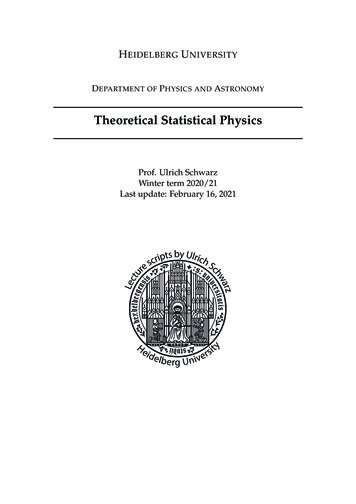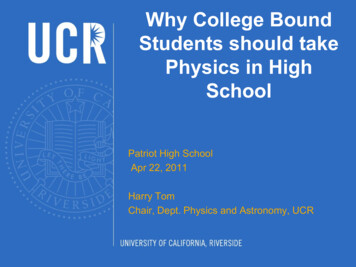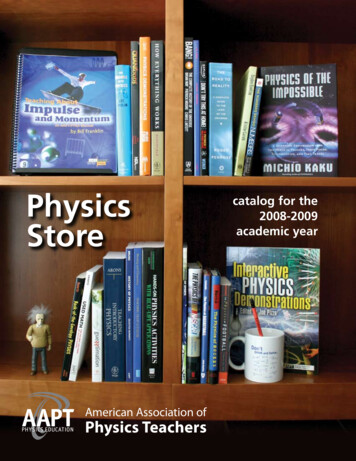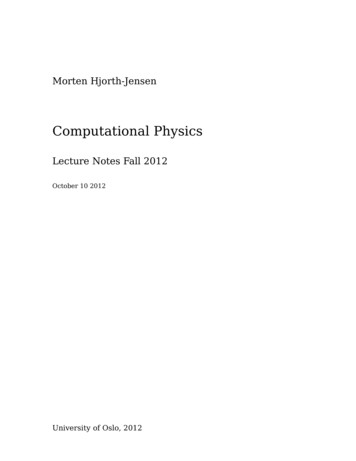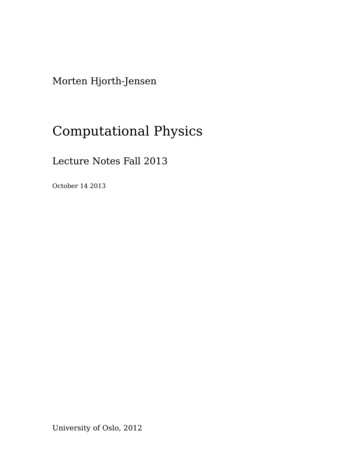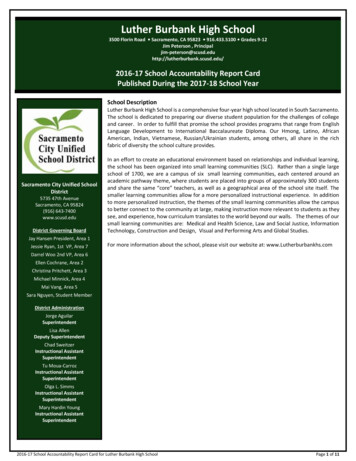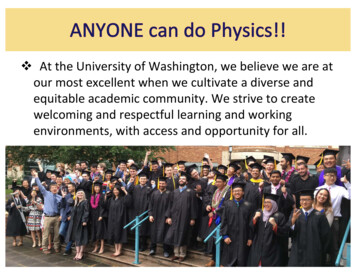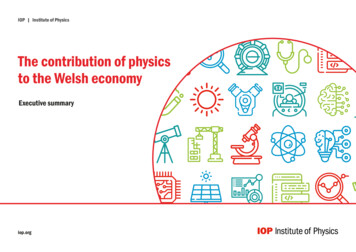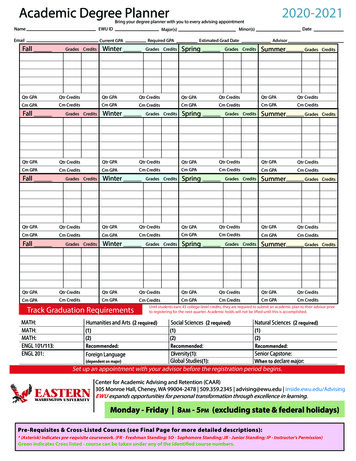
Transcription
rsity of Wisconsin-MadisonDepartment of Physicswww.physics.wisc.edu
CONTENTSDepartment of PhysicsUniversity of WisconsinDepartment of Physics2320 Chamberlin Hall1150 University AvenueMadison, WI 53706Tel: 608.262.4526Fax: 608.262.3077E-mail: info@physics.wisc.eduWeb: www.physics.wisc.eduUW Guide hysics/Department of Physics ChairProfessor Mark Eriksson2320 A Chamberlin HallTel: 608.263.6289maeriksson@wisc.eduWELCOME . 3DIRECTORY . 4Staff Offices . 4Admin Offices & Facilities . 4Faculty Listing . . 5Faculty Listing – Areas of Research . 6Physics Faculty . . . 7Affiliated Faculty . 11UNDERGRADUATE PHYSICS PROGRAM . 12Why Choose to Be a Physics Major 12Why Study Physics . 12Options . . 12MAJORING IN PHYSICS . 13To Declare a Physics Major . 13Engineering and Other Non-L&S Majors . 13Requirements . 14Transitional Requirement Notes 14Introductory Requirements . 14Core Requirements 14Laboratory Requirements 14Advanced Physics Electives . 14L&S Residence and Quality of Work in Major Requirements . 15L&S Graduation Requirements . 15Suggested Curriculum . 15Intermediate and Advanced Lab Courses . 15Mathematics . 15Chemistry . 16Computing . 16Degree Audit Reporting System (DARS) 16Recommended Program 17-18Introductory Physics Course Selection Flow Chart 19GRADE CHANGES & INCOMPLETES . 20Policy on Grade Changes . 20Policy on Incompletes . 202021-22Physics Majors Handbook 1
DEGREE OPTIONS 21Looking for a Physics Club?Check out the UPS (UniversityPhysics Society) located in 2328Chamberlin Hall or findinformation on page 27.Certificate in Physics .Honors in the Major – Physics .Honors in Physics Courses .Astronomy-Physics Major .Applied Mathematics, Engineering & Physics (AMEP) hysicsclubRESEARCH EXPERIENCE .26THE PHYSICS CLUB . 28PEER MENTORING . 30UNDERGRADATE STUDENT AWARDS . 31COLLOQUIA & SEMINARS 322 Physics Majors Handbook2021-22
WELCOMEWDepartment ChairProf. Mark Erikssonelcome to the UW-MadisonDepartment of Physics!We have a long history of providing ourstudents with a great educational experience.That experience will increase yourunderstanding of the physical universe andprovide you with the foundation for your futurecareer. Expect hard work that pays bigdividends.If you have concerns about your studies in thedepartment, you should discuss them with thefaculty member in charge of the course you areinterested in, or with the teaching assistantwho has responsibility for the discussion orlaboratory to which you are assigned.Apart from purely academic matters, we areinterested in your personal well-being. If thereis anything you think we can help with, contactthe department office, or email:info@physics.wisc.edu5118 Chamberlin Hall2320A Chamberlin HallTel: 608.263.6289maeriksson@wisc.eduAssociate ChairProf. Mark Rzchowski5114 Chamberlin HallTel: 608.265.2876rzchowski@physics.wisc.eduAssociate Chair,Alumni Relations &Board of VisitorsProf. Bob Joynt5328 Chamberlin HallTel: 608.263.4169rjoynt@wisc.edu2021-22Physics Majors Handbook 3
DIRECTORYUndergraduate AdvisorsProf. Tulika Bose4223 Chamberlin HallTel: 608.262.8894tulika@hep.wisc.eduProf. Jan Egedal3275 Chamberlin HallTel: 608.262.3628egedal@wisc.eduProf. Deniz Yavuz5320 Chamberlin HallTel: 608.263.9399yavuz@wisc.eduAMEP Physics AdvisorsProf. Cary Forest3277 Chamberlin HallTel: 608.263.0486cbforest@wisc.eduProf. Robert McDermott5112 Chamberlin HallTel: 608.263.4476rjmcdermott@wisc.eduProf. Thad Walker5322 Chamberlin HallTel: 608.262.4093tgwalker@wisc.eduProf. Deniz Yavuz5320 Chamberlin HallTel: 608.263.9399yavuz@wisc.edu4 Physics Majors HandbookDepartment of Physics StaffAdministrative StaffAnn AustinKeeley BannonMike BomanAmie HeringJackson KennedySylvia Swift KmiecAimee LefkowDonald MinerAllison TredinnickTravis WarwickOffice2320 C521723202320 D2320 E4288428142882320 ions & OutreachOfficePhoneMallory ConlonHaddie McLeanSarah PerdueInstructional StaffAbdollah MohammadiSteve NarfJim ReardonJeffrey R SchmidtBenjamin SpikeDaniel ThursBrett Unks526512092320 HOffice262.2927262.3051PhoneIT/ComputingDan BradleyChad SeysPhysics Learning CenterEric HooperAmihan HuesmannChris MooreSusan NossalBryan SchenkerAkire Trestrail23372320 sics.wisc.eduOffice2337233423342337 ics.wisc.eduAdministrative Offices & FacilitiesPhysics Department OfficeHigh Energy/Theory/PheoPlasmaElectronics ShopInstrument ShopAMP LibraryStudent Shop23204288329033361228422012492021-22
Department of Physics FacultyNameYang BaiA. Baha BalantekinVernon BargerKeith BechtolUwe BergmannKevin BlackStanislav BoldyrevTulika BoseVictor BrarDuncan CarlsmithDaniel ChungSridhara DasuJan EgedalMark ErikssonLisa EverettKe FangCary ForestPupa GilbertFrancis HalzenKael HansonAkikazu HashimotoMatthew HerndonRobert JoyntAlbrecht KarleShimon KolkowitzJames LawlerAlex LevchenkoLu LuDan McCammonRobert McDermottMoritz MünchmeyerMarshall OnellionYibin PanBrian RebelMark RzchowskiMark SaffmanJohn SarffGary ShiuPaul TerryPeter TimbieJustin VandenbrouckeMaxim VavilovThad WalkerSau Lan Yu WuDeniz YavuzEllen ibel@astro.wisc.eduPhysics Majors Handbook 5
FACULTY LISTING—AREAS OF RESEARCHAstrophysics & Cosmology ExperimentalistsBechtol Boldyrev Fang Forest Halzen Karle Lu McCammon Sarff Terry Timbie ZweibelCosmology TheoristsChung Shiu MünchmeyerWisconsin IceCube Particle Astrophysics Center (WIPAC)wipac.wisc.eduWisconsin Quantum Institutewqi.wisc.eduAtomic, Molecular & Optical PhysicsKolkowitz Saffman Walker Yavuz LawlerCondensed Matter Physics ExperimentalistsBergmann Brar Eriksson Gilbert McDermott Onellion RzchowskiCondensed Matter Physics TheoristsLevchenko Joynt VavilovHigh Energy ExperimentalistsBlack Bose Carlsmith Dasu Herndon Karle Lu Pan Rebel WuHigh Energy TheoristsBai Balantekin Barger Chung Everett Halzen Hashimoto ShiuNeutrino & Astroparticle Physics ExperimentalistsFang Halzen Hanson Karle Lu McCammon VandenbrouckeNeutrino & Astroparticle Physics TheoristsBai Balantekin Barger Chung Everett Fang HalzenNuclear TheoristsBalantekinPlasma Physics ExperimentalistsBoldyrev Egedal Forest Sarff ZweibelPlasma Physics TheoristsBoldyrev Egedal Terry ZweibelQuantum Computing ExperimentalistsEriksson McDermott Saffman WalkerQuantum Computing TheoristsJoyntBiophysicsBergmann Gilbert WalkerPhysics Majors Handbook 62021-22
PHYSICS FACULTYYang BaiAssociate ProfessorKeith BechtolAssistant ProfessorStanislav BoldyrevProfessorDuncan CarlsmithProfessor2021-22A. Baha BalantekinEugene P. Wigner ProfessorUwe BergmannMartin L. Perl Endowed ProfessorTulika BoseProfessorDaniel J ChungProfessorVernon BargerVilas Professor & Van Vleck ProfessorKevin BlackProfessorVictor BrarVan Vleck Assistant ProfessorSridhara DasuProfessor7 Physics Majors Handbook
Jan EgedalProfessorKe FangAssistant ProfessorFrancis L HalzenGregory Berit Professor& Hilldale ProfessorMark A ErikssonJohn Bardeen Professor of Physics& Department ChairpersonLisa L EverettProfessorCary ForestPrager Professor of ExperimentalPhysicsPupa GilbertVilas Distinguished AchievementProfessorKael D HansonProfessor, WIPAC DirectorMatthew F HerndonProfessorRobert J JoyntProfessorShimon KolkowitzAssistant ProfessorJames E LawlerArthur and Aurelia SchawlowProfessor8 Physics Majors HandbookAkikazu HashimotoProfessorAlbrecht KarleProfessorAlex LevchenkoProfessor2021-22
Lu LuAssistant ProfessorMortiz MünchmeyerAssistant ProfessorBrian RebelAssociate ProfessorJohn S SarffProfessorPeter TimbieProfessor2021-22Dan McCammonProfessorMarshall F OnellionProfessorMark RzchowskiAssociate Chairperson& ProfessorRobert F McDermottProfessorYibin PanAssociate ProfessorMark SaffmanProfessorGary ShiuProfessorPaul W TerryProfessorJustin VandenbrouckeProfessorMaxim VavilovProfessorPhysics Majors Handbook 9
Thad G WalkerProfessorSau Lan Yu WuEnrico Fermi Professor& Vilas ProfessorDeniz YavuzProfessorEllen G ZweibelWilliam L Kraushaar Professor ofAstronomy & Physics10 Physics Majors Handbook2021-22
Affiliated FacultyDavid AndersonAffiliated ProfessorPaul CampagnolaAffiliated ProfessorJennifer ChoyAffiliated ProfessorElena DonghiaAffiliated ProfessorChang-Beom EomAffiliated ProfessorChris HegnaAffiliated ProfessorSebastian HeinzAffiliated ProfessorMikhail KatsAffiliated ProfessorJason KawasakiAffiliated ProfessorIrena KnezevicAffiliated ProfessorAlexandre LazarianAffiliated ProfessorOliver SchmitzAffiliated ProfessorCarl SovinecAffiliated Professor2021-2211 Physics Majors Handbook
UNDERGRADUATE PHYSICS PROGRAMRoughly speaking, Physics is to theinanimate world what philosophy is to thepatterns of human thought. We observe,describe, categorize, synthesize, andabstract. At one time, in fact, Physics wasnatural philosophy.But in the modern era, the two have parted company.Science moved away from the guidance of philosophersand adopted its own approach to truth, asserting thatmeasurement is the precise form of questioning and thatprecise questioning is the beginning of understanding.Physics is the science of the properties of matter,radiation, and energy in all forms. As such,it is the most fundamental of the sciences. Itprovides the underlying framework for the otherphysical sciences and engineering and forunderstanding physical processes in biological andenvironmental sciences.CHOOSE TO BE A PHYSICS MAJORWhy Study Physics?Intellectual Satisfaction.First, and foremost, Physics satisfies our deepdesire to understand how the universe works.Physics is interesting.2 . Intellectual Challenge .By striving for fundamental understanding, thephysicist accepts the challenge to move past amerely descriptive approach of our world andprobes deeply into how and why it works.3 . Physics Produces New Technology.Today’s esoteric Physics research will becometomorrow’s technological advances.4 . Technical Expertise.Physicists exploit forefront technologies in theirpursuits.12021-225. Flexibility.In a fast-paced and changing world, it is muchmore important to have a broad substantiveeducation than to be trained in a specific skill. Weteach people how to think, and how to apply andextend what they know to new types of problems.6. Physics is Analytical and Quantitative.People who can reason analytically andquantitatively are essential for the success ofalmost any pursuit.OptionsA degree in Physics helps prepare you foremployment in industry, research, government, andacademia. A bachelor’s degree from theundergraduate Physics program will provide anoverall view of both classical and modern Physicsalong with problem-solving ability and the flexibility tocontinue learning.Your training can: Prepare you for employment in industrial orgovernmental laboratories.Prepare you for graduate studies for masters ordoctoral degrees in experimental or theoreticalPhysics.Provide a broad background for further workin other sciences, such as materials sciences,aerospace, astronomy, computer science,geophysics, meteorology, radiology, medicine,biophysics, engineering, and environmentalstudies.Provide a science-oriented liberal education.Thistraining can be useful in some areas of businessadministration, law, or other fields where a basicknowledge of science is useful.Provide part of the preparation you need toteach Physics. To teach Physics in high school,you will also take education courses to becomecertified. You will need a doctoral degree tobecome a college or university professor.Physics Majors Handbook 12
MAJORING IN PHYSICSHelpful HintsFor the most up-to-dateinformation:UW Physics: phyiscs.wisc.eduUW /physics/Undergraduate AdvisorsProf. Tulika Bose4223 Chamberlin HallTel: 608.262.8894tulika@hep.wisc.eduProf. Jan Egedal3275 Chamberlin HallTel: 608.262.3628egedal@wisc.eduProf. Deniz Yavuz5320 Chamberlin HallTel: 608.263.9399yavuz@wisc.eduDepartment OfficePhysics Department Office1150 University Ave.2320 Chamberlin HallThe form for declaring a Physicsmajor or certificate in Physics isavailable at the front desk in thedepartment office.13 Physics Majors HandbookAs soon as a student decides, and before the end of thesophomore year, prospective Physics majors should discusstheir plans and curriculum with the appropriate undergraduateadvisor. A list of advisors is available on page 4 or from thePhysics Department website. Students should consult theUniversity of Wisconsin Guide page for the generalrequirements for BA and BS degrees.TO DECLARE A PHYSICS MAJORYou must declare your major by filling out a “major declaration form,” signedby a Physics Department Undergraduate Advisor. You should talk with one ofthe undergraduate advisors as soon as you know you might have an interestin the Physics major. Students can declare their Physics major at any timeafter completing their first Physics course on the UW-Madison campus, andwe encourage doing this as early as possible. You must have a 2.5 GPA inphysics and math courses taken at Madison at the time you declare. In allcases, the major must be declared before the semester in which yougraduate. The form can be obtained from the front desk in the departmentoffice, located in 2320 Chamberlin Hall. You should bring a copy of yourcurrent course history when you talk with a Physics DepartmentUndergraduate Advisor. Note: All L&S undergraduate students are requiredto declare a major of be admitted into a program before or upon thecompletion of 86 credits (including credits from transfer, AP, test, studyaboard, or retroactive credits.Engineering and Other Non-L&S Majors Seekingan “Additional Major” in PhysicsAn undergraduate in the College of Engineering or any college other thanLetters and Science (L&S) needs to complete the Physics requirements forthe Physics major; and the L&S residence and quality of work in the majorrequirements. None of the other requirements of the College of L&S need tobe satisfied. Students majoring in any other program that is NOT in the L&Srequire a formal approval from the other college to declare the additionalmajor in Physics. This process may delay declaring the major the major inPhysics.2021-22
REQUIREMENTSThe requirement is a total of 35 credits.The 35 credits must include these fourgroups:1 . Introductory RequirementsFirst Course: Physics 247 (recommended) or 207or 201 or (EMA 201 and either EMA 202 or ME240)Second Course: Physics 248 (recommended) or 208 or 202Third Course: Physics 249 (recommended) or 205 or 235 or 241 or 244Note: A maximum of 5 credits from EMA 201, EMA 202, and ME 240 count toward the 35required. The introductory course sequence consists of three courses: Physics247/Physics 248/Physics 249 in the honors sequence recommended for prospectivephysics majors, Physics 201/Physics 202/Physics 205 is recommended for engineers,and Physics 207/ Physics 208/Physics 241 is intended for life sciences and chemistrymajors, and is suitable alternative for physics majors. Although we recommend followingone of these sequences, it is allowed to mix them with the exception that transfers intothe Physics 247/Physics 248/ Physics 249 honors sequence are not permitted.2 . Core RequirementsMechanics: Physics 311Electromagnetic Fields: Physics 322 or (ECE 220, 320 and 420)Thermal Physics: Physics 415 or (CHEM 561 and 562) or ME 361Quantum Physics: Physics 448 and 449 (recommended) or Physics 531Note: A maximum of 3 credits from CHEM 561 and 562 apply toward the35 required. A maximum of 3 credits from ECE 220 and ECE 320 and ECE420 apply toward the 35 required.3 . Laboratory RequirementsAll Physics majors must take 6 credits of intermediateand/or advanced lab.Full registered credit per course: Physics 307, 407Two credits applies for each of these courses: Physics 321, 325, 623,625, NE 427, 428One credit applies for each of these courses: ECE 305, 313Note: We recommend starting with Physics 307, which includes a strong introduction tostatistics and data analysis, but it is advantageous to wait until you have completed anintroduction to Modern Physics. Physics 321 can be taken any time after completion of202, 208 or 248. Physics 325 requires at least concurrent enrollment in Physics 322.Physics 407 requires completion of Physics 448 or 531. Non-course researchexperience is invaluable and very strongly encouraged, but seldom offers exposure tobreadth of experiemental techniques covered in Physics 407. Lab course credit forsuch exposure will be granted only in exceptional circumstances.Note: For non-physics courses, students will recieve only the credit applied as labtoward the 35 credit requirement.Note: Non-physics lab courses not listed above may be considered for lab creditif approved by a physics advisor, but must cover substantially the same breadth and depth ofexperience as one of the physics lab courses.4 . Advanced Physics ElectivesTransition NotesNote 1Physics majordeclared prior to Fall2015If you declared a Physicsmajor at UW-Madisonbefore September 2, 2015,you will graduate under theold core requirement ofPhysics 311 and 322 .There are other minordifferences .Please consult with anundergraduate Physicsadvisor.Note 2Took Physics 307,308, or 407 Priorto August 1, 2011If you have taken Physics307, 308, or 407, ORdeclared a Physics majorbefore August 1, 2011, youwill graduate under theeven older requirements of32 credits of Physics,including 2 credits ofintermediate/advanced lab(or 3 creditsif you have takenPhysics 249) .Note 3Prior to Spring 2019Physics 325 does notprovide lab credits, andPhysics 308 providescredits toward thelaboratory requirement.Questions regardingtransition notes?Please see anundergraduate Physicsadvisor.The remaining credits to total 35 must be from advanced level Physics courses (see“Level:” designation in the course description), or Physics 301. The PhysicsDepartment suggests that your program include the seminar on Physics TodayPhysics Majors Handbook 14(Physics 301) .2021-22
L&S Residence and Qualityof Work in the MajorRequirements 2.000 GPA in all major and majorsubject (Physics) courses 2.000 GPA in all upper level work inthe major. All courses that wouldcount toward core, laboratory, andadvanced Physics electives areincluded. 15 credits of upper level work in themajor must be taken in residence.All courses that would count towardcore, laboratory, and advancedPhysics electives will count towardthis requirement.L&S GraduationRequirementsThe University of Wisconsin College ofLetters and Science also has curriculumrequirements for the Bachelor of Arts andBachelor of Science degrees: Foreign LanguageBS - third-year level in high school, orequivalent .BA - fourth level in one language, ORthird level in one language and secondlevel in another language . Communication (A & B) Quantitative Reasoning (A & B) Breadth Requirements Minimum 12credits HumanitiesMinimum 12 credits Social ScienceMinimum 12 credits Natural ScienceMinimum 3 credit Ethnic Studies Total Degree Credits: 120 Liberal Arts and Science Credits: 108SUGGESTED CURRICULUMThe appropriate program for a student’s goals should be established withthe help of the advisor. For the introductory program, Physics 247-248249 is strongly recommended,but the listed substitutes are acceptable.Note, however, that Physics 247 is offered only in the fall semester. It ispossible to enter the core program in either semester since 201, 202, 205,207, 208, 235, 241, 311, and 322 are offered each semester.Intermediate andAdvanced Lab CoursesStudents are encouraged, but not required, to take 307 after completingPhysics 205, 235, 241, or 249. Physics 407 provides a lab experiencecloser to that of actual research, with more student initiative and lessoverall structure .This option should be seriously considered by thoseintending to go on to graduate school in Physics or who desire a broadand thorough background in laboratory work . Physics 407 can be takenfor two or four credits, but consent of instructor is required to take itwithout first having 307. Please note that due to enrollment pressure,the 4-credit option is often not available.Physics 321 provides experience in electronics and is useful, but notrequired, preparation for the other laboratory courses. 321 is a four creditcourse, including two credits of intermediate laboratory that can be usedtoward fulfilling your laboratory requirement. Physics 623 provides similarexperience at a significantly higher level, but has no additional prerequistes. Physics 325 is a four credit course in optics, includingtwo credits that count toward the lab requirement. Finally, Physics 625 isan advanced, four credit course in applied optics that includes two creditsof advanced laboratory work. It can be taken by undergraduates who havecompleted Physics 322, but is more challenging than 325.MathematicsThere are specific math courses listed as prerequisites for our Physicscourses. Depending on your interest in math (some Physics majors alsomajor in Math as well), the courses you select may be different.A typicalmath sequence is: Math 221, 222, 234, 319, (or Math 320 instead of319/340), 321, 340, 322. Please consult with an advisor when choosingyour Mathematics courses, particularly before deciding on one of thehonors sequences in Math. We do not recommend the honors sequencesfor physics majors unless you are considering a second major in Math. 15 Physics Majors HandbookMath 221/222: Standard Introductory calculus sequence.Math221 is a prerequisite to Physics 247, 207, and 201 .Math 234: Calculus of Several Variables, typically taken tocomplete the sequence Math 221/222/234.This course can betaken simultaneously with Math 319 .Math 319: Techniques in Ordinary Differential Equations.You are strongly advised to take this and Math 340, orMath 320 before Physics 311 (Mechanics).2021-22
Math 340: Elementary Matrix and Linear Algebra.This course is a bridgebetween concrete and abstract math .The next step for students interested inmore abstract math is Math 521/522 (Advanced Calculus). Many Physicsstudents find Math 340 to be particularly useful for Physics 311 and later forquantum mechanics and we strongly suggest taking it or Math 320 . Math 320is a "light" version of Math 319 and 340. It is adequate for the rest of ourundergraduate physics curriculum, but is not recommended for those planningon continuing to graduate school. There is a special honors section, Math320!, that thoroughly covers all of the material in 319 and 340. Werecommend it as a good way to fit in both topics before you take Physics311, but it is a more challenging course, and seems to be taught irregularly. Math 321: Applied Mathematical Analysis. Techniques for solving problems inthe physical sciences, engineering, and applied mathematics, using advancedcalculus and analytic function theory. It is recommended that Math 321 be takenbefore taking Physics 322. Math 321 is a highly recommended for physics majors,but requires a significant time commitment. Math 322: Applied Mathematical Analysis .Techniques for solving partialdifferential equations, with an emphasis on practical problems in the physicalsciences . Also covers special functions, Fourier Transformations, etc .Math 321and 322 are recommended for those planning to continue on to graduateschool in Physics .ChemistryA college course in chemistry is advised for all Physics students . Courses in physical and organic chemistryare useful for Physics students. Organic chemistry is particularly valuable for those interested in biophysics orother life sciences.ComputingStudents are advised to learn the methods of scientific programming. The most useful courses would bein Python or C and C .Degree Audit Reporting System (DARS)The Degree Audit Reporting System (DARS) is part of UW-Madison’scommitment to academic advising for undergraduate students. A DARS report isparticularly helpful when combined with the personal wisdom and insight ofskilled advisors. DARS reports should always be reviewed with transcripts.Thisreport becomes increasingly important as a student first decides on a particularcollege, then determines a particular major or combination of majors, and finallyapproaches graduation. DARS shows which requirements have already beencompleted and which remain unsatisfied.The report can offer suggestions aboutappropriate courses that may be taken to meet specific requirements.DARS is notintended to replace student contact with academic advisors. Students shouldprint their DARS report through their MyUW. DARS may be helpful in showinghow completed or in-progress courses may be used in different degree ysics Majors Handbook 16
RECOMMENDED PROGRAMSuggested Program for Physics Majors – Starting Physics in the Fall of First YearFallSpringComments:Year 2PHY 249 (4 cr)Math 320!PHY 321 (4 cr)Physics 311 (3 cr)Physics 307 (2 cr)Physics 301 (1 cr) **Math 321Instead of Math 320!, students cantake Math 319 and Math 340Year 3PHY 322 (3 cr)Math 322PHY 323 (3 cr)PHY 415 (3 cr)Year 4PHY 448 (3 cr)PHY 407 (2 or 4)Year 1PHY 247 (5 cr)*Math 222PHY 248 (5 cr)Math 234PHY 449 (3)ElectivesDue to enrollment pressure in PHY407, the 4 credit option is often notavailableAccelerated program: Students entering with Math 222 credit can move Math 234, 319, 321 and Physics 311– 322 sequences up by onesemester, and Physics 448–449 to the third year. (Physics 407 lab can be delayed to the fourth year.)The underlined courses are the “Physics Core Program .” The senior year could include electives, such as 525, Introduction to Plasmas;535, Introduction to Particle Physics; 551, Solid State Physics; 623, Electronics ; or 625, Applied Optics.* Some students take Physics 115 in their first semester to see if they really want to go into Physics .** Physics 301, Physics Today, is an introduction to modern fields of Physics research and, with permission, canbe taken more than once (though counted only once toward the 30 credits requirement in Physics). It may also be attended as acolloquium series with no registration, credit, or requirements .Suggested Program for Physics Majors – Starting Physics in the Fall of Second YearFallSpringCommentsYear 2PHY 247 [5]Math 234Math 319PHY 248 [5]Math 340PHY 301 [1]Can take Math 320! instead of Math 319 Math 340Year 3PHY 249 [4]PHY 311 [3]Math 321PHY 322 [3]PHY 307 [2]PHY 415 [3]PHY 448 [3]PHY 321 [2 2]PHY 449 [3]PHY 407 [2]Year 1Year 4Math 22117 Physics Majors HandbookMath 222PHY 415, PHY 325 can be taken in Y3 (orY4) SpringAlternatives:1.PHY 321 (Y4 Fall) and PHY 325 (Y4Spring) (instead of PHY 407)2.Both PHY 325 & 2 credits PHY 407(Y4 Spring) and no PHY3213.PHY 325 could also be taken in Y3Spring2021-22
RECOMMENDED PROGRAMSuggested Program for Physics Majors – Starting P
Physics Learning Center Office Phone Email . Physics Department Office 2320 262.4526 info@physics.wisc.edu. High Energy/Theory/Pheo 4288 262.2281. Plasma 3290 262.3595. Electronics Shop 3336 262.0527. Instrument Shop 1228 262.7380 .
